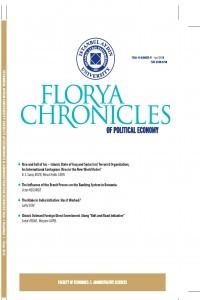Psikolojik Sermaye Kavramı Üzerine Bir İnceleme
Bu çalışmanın amacı, son yıllarda literatürdeki çalışma sayısı hızla artış gösteren ve örgütsel davranış bilimi yazınında odak noktası konulardan biri haline gelen “psikolojik sermaye” kavramının tanımı, özellikleri, tarihsel gelişimi ve günümüzdeki örgütler açısından önemine değinerek son yıllarda konuyla ilgili Türkiye’de ve dünyada yapılan bazı çalışmaların bir değerlendirmesini yapmaktır. Çalışmada son yıllarda psikolojik sermaye kavramının anlamına, önemine ve yaratabileceği olumlu etkilere değinen ulusal ve uluslararası bilimsel yayınlar incelemeye alınmıştır
Anahtar Kelimeler:
Psikolojik sermaye, pozitif psikoloji, örgütsel davranış
An Investigation On The Concept Of Psychological Capital
The purpose of this study is to examine the importance of the concept of “psychological capital” which has become one of the focal points in the literature of organizational behavior, which has been rapidly increasing in the literature in recent years, and its importance in terms of today’s organizations. National and international scientific publications that have been published in recent years and those that refer to the significance and positive effects of the concept of psychological capital have been examined
___
- Bandura, A. (1997). Self-efficacy: The exercise of control. New York, NY: Freeman.
- Avey, J. B., Wernsing, T. S., & Luthans, F. (2008). Can positive employees help positive organizational change? Impact of psychological capital and emotions on relevant attitudes and behaviors. Journal of Applied Behavioral Science, 44, 48–70.
- Avey, J. B., Hughes, L. W., Norman, S. M., & Luthans, K. (2008). Using positivity, transformational leadership and empowerment to combat employee negativity. Leadership and Organization Development Journal, 29, 110–126.
- Ardichvili, A. (2011). Invited reaction: Meta-analysis of the impact of psychological capital on employee attitudes, behaviors, and performance. Human Resource Development Quarterly, 22, 153–156.
- Demerouti, E., van Eeuwijk, E., Snelder, M., & Wild, U. (2011). Assessing the effects of a “personal effectiveness” training on psychological capital, assertiveness and self-awareness using self-other agreement. Career Development International, 16, 60–81.
- Luthans, F., Avey, J. B., Avolio, B. J., Norman, S., Combs, G. (2006). Psychological capital development: Toward a micro-intervention. Journal of Organizational Behavior, 27, 387–393.
- Luthans, F., Avey, J. B., Clapp-Smith, R., & Li, W. (2008). More evidence on the value of Chinese workers’ psychological capital: A potentially unlimited competitive resource? International Journal of Human Resource Management, 19, 818–827.
- Luthans, F., Avolio, B. J., Avey, J. B., & Norman, S. M. (2007). Positive psychological capital: Measurement and relationship with performance and satisfaction. Personnel Psychology, 60, 541–572.
- Luthans, F., & Youssef, C. M. (2004). Human, social, and now positive psychological capital management. Organizational Dynamics, 33, 143–160.
- Stajkovic, A. D., & Luthans, F. (1998). Self-efficacy and work related performance: A meta-analysis. Psychological Bulletin, 124, 240– 261.
- Walumbwa, F. O., Luthans, F., Avey, J. B., & Oke, A. (2011). Authentically leading groups: The mediating role of collective psychological capital and trust. Journal of Organizational Behavior, 32, 4–24.
- Akdoğan, A. Ve S. Polatcı (2013). “Psikolojik Sermayenin Performans Üzerindeki Etkisinde İş Aile Yayılımı ve Psikolojik İyi Oluşun Etkisi”, Atatürk Üniversitesi Sosyal Bilimler Enstitüsü Dergisi, 17 (1): 273-293.
- Erkmen, T. Ve E. Esen (2012). “Psikolojik Sermaye Konusunda 2011 Yıllarında Yapılan Çalışmaların Kategorik Olarak İncelenmesi”, Mustafa Kemal Üniversitesi Sosyal Bilimler Enstitüsü Dergisi, 9 (19):89- 103.
- Goldsmith, H. A., J. R. Veum ve W. Darty (1997). “The Impact of Psychological and Human Capital on Wages”, Economic Inquiry, 45:815- 829.
- Görgens-Ekermans, G. Ve M. Herbert (2013). “Psychological Capital: Internal and External Validity of the Psychological Capital Questionnaire (PCQ-24) on a South African Sample. SA Journal of Industrial Psychology/ SA Tydskrif vir Bedryfsielkunde, 39 (2):1-12.
- Kucharcikova, A. (2011). “Human Capital: Definitions and Approaches”, Human Resources Management & Ergonomics, 5 (2):60-70. [19] Lehoczky, H M. (2013). “The Socio-Demographic Correlations of Psychological Capital”, European Scientific Journal, 9 (29):26-42.
- Shahnawaz, G. M. Ve H. Jafri (2009). “Psychological Capital as Predictors of Organizational Commitment and Organizational Citizenship Behaviour”, Journal of the Indian Academy of Applied Psychology, 35 (Special Issue): 78-84.
- Süral Özer, P., T. Topaloğlu ve Ö. N. Timurcanday Özmen (2013). “Destekleyici Örgüt İkliminin, Psikolojik Sermaye ile İş Doyumu İlişkisinde Düzenleyici Etkisi”, Ege Akademik Bakış Dergisi, 13 (4): 437- 447.
- Maslow, A. H. (1954). Motivation and Personality, Harper, New York.
- Baron, A., & Armstrong, M. (2007). Human Capital Management. Instituto Piaget, Lisboa.
- Scheier, M. F., Carver, C. S., & Bridges, M. W. (2001). Optimism, pessimism, and psychological well-being. Optimism and pessimism: Implications for theory, research, and practice, 1, 189-216.
- McKenny, A. F., Short, J. C., & Payne, G. T. (2013). Using -computer-aided text analysis to elevate constructs: An illustration using psychological capital. Organizational Research Methods, 16(1), 152- 184.
- Seligman, M. E. (2002). Positive psychology, positive prevention, and positive therapy. Handbook of positive psychology, 2, 3-12.
- Seligman, M. E. (1998). What is the good life. APA Monitor, 29 (10), 2.
- Steptoe, A., Dockray, S., & Wardle, J. (2009). Positive affect and psychobiological processes relevant to health. Journal of personality, 77(6), 1747-1776.
- Keleş, H. N. (2011). Y kuşağı çalışanlarının motivasyon profillerinin belirlenmesine yönelik bir araştırma, Organizasyon ve Yönetim Bilimleri Dergisi, 3 (2).
- Aras, G., & Crowther, D. (2009). Corporate sustainability reporting: a study in disingenuity? Journal of business ethics, 87(1)279.
- ISSN: 2149-5750
- Yayın Aralığı: Yılda 2 Sayı
- Başlangıç: 2015
- Yayıncı: İstanbul Aydın Üniversitesi
Sayıdaki Diğer Makaleler
Economic Development In Africa: Salient Trends and Priorities
Turkey’s Education Diplomacy With Africa
Food Security And Drawbacks Of Neo-Liberal Food Policies
Lord Curzon and the Use of Secret Intelligence at the Lausanne Conference: 1922-1923
Political Violence and Terrorism: Insight Into Niger Delta Militancy and Boko Haram
Özüm Sezin UZUN, Yusuf Saheed ADEGBOYEGA
Development as Systems: Systems Frameworks, Sub-Saharan African Development, and Health Systems
Sanal Organizasyonların Yönetim Fonksiyonları Açısından Geleneksel Organizasyonlardan Farklılıkları
Relationship Between Political Instability & Growth In Some Selected Mena Countries
